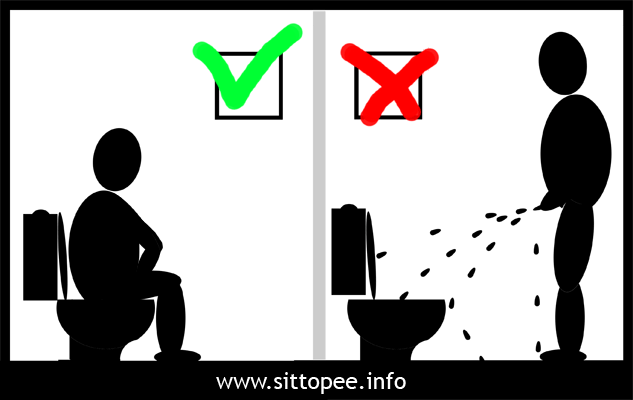There is a continuous discussion about wether sitting to pee is more healthy than standing or not. de Jong Y, Pinckaers JHFM, ten Brinck RM, Lycklama à Nijeholt AAB, Dekkers OM from LUMC (Leiden, The Netherlands) did a Systematic Review and Meta-Analysis on this subject. Their conclusion is:
For healthy men, no difference is found in any of the urodynamic parameters. In patients with LUTS, the sitting position is linked with an improved urodynamic profile. Urinating in sitting position beneficial for men with enlarged prostate
Men with benign prostate hypertrophy, a condition in which the prostate is enlarged are shown to urinate better in sitting position compared to standing. According to a new study published in PLOS ONE, this position is related to a reduced amount of urine in the bladder after urinating.
For most men, the prostate grows with age. Due to this enlargement, the urinary flow decreases and urine may be left in the bladder after urinating. Men with an enlarged prostate are prone to complications, such as cystitis and bladder stones. “Some doctors advise these patients to urinate in the sitting position. However, until today there was no clinical evidence for this advice” according to Ype de Jong, fifth year medical student at the LUMC and shared first author of the article.
LUMC-students and shared first authors Ype de Jong, Hans Pinckaers and Robin ten Brinck studied scientific articles on the subject of urination and position. Led by the urologist prof. dr. Lycklama à Nijeholt and epidemiologist dr. Dekkers, they selected 11 articles that were eligible for statistical analysis. The results were surprising: men with urologic problems related to an enlarged prostate were shown to urinate better in the sitting position. The amount of urine that remains in the bladder is reduced, while a trend towards an increased urinary flow and shorter time spent urinating is seen. The explanation is simple: “in the sitting position, the muscles of the pelvic floor and legs are more relaxed which allows for a less obstructed voiding of urine”, says De Jong
Anxiety to fall
Problems related to an enlarged prostate can occur in middle-aged man and are age related. . However, the elderly suffer the most. “Of men above 80 years old, more than 90 percent have difficulties urinating due to an enlarged prostate. Due to their age, these men are prone to fall if they urinate in the standing position. In reflex, the anxiety to fall results in contraction of the pelvic muscles, making it difficult to empty the bladder completely.”
Drugs that cause the muscles surrounding the bladder to relax can provide relief of symptoms. However, De Jong and co-authors now show that sitting during urination is almost as effective. “However, we do not advise patients to stop taking their prescribed medication. Combining this medication with urinating in the sitting position may give the best clinical results”, according to De Jong.
Another, equally important result of the study is the effect of position on healthy males – or more correctly, the absence of effect. Hans Pinckaers: “no influence of position was found in healthy males. This means that for this group, there are no medical arguments to change voiding position.” Robin ten Brinck adds, smiling: “we understood that the subject of our study sometimes leads to discussions, especially between couples. For the first time it is possible to provide, not only hygienic, but also solid scientific arguments.”
The article is published in the open-access journal PLOS ONE, an online journal which is accessible for everyone.
|

